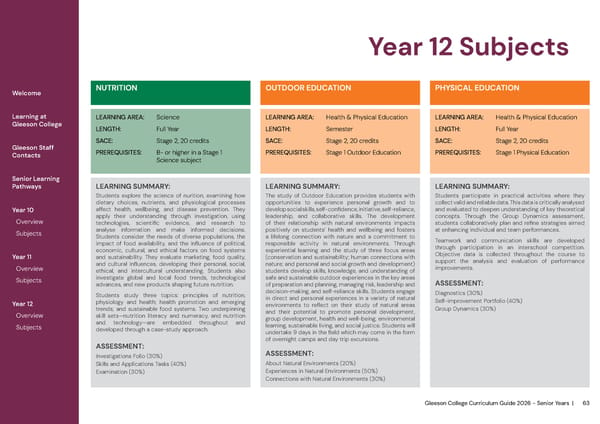Gleeson College Curriculum Guide 2026 - Senior Years | 63 Year 12 Subjects Welcome Learning at Gleeson College Gleeson Staff Contacts Senior Learning Pathways Year 10 Overview Subjects Year 11 Overview Subjects Year 12 Overview Subjects LEARNING SUMMARY: ASSESSMENT: Investigations Folio (30%) Skills and Applications Tasks (40%) Examination (30%) NUTRITION LEARNING AREA: Science LENGTH: Full Year SACE: Stage 2, 20 credits PREREQUISITES: B- or higher in a Stage 1 Science subject OUTDOOR EDUCATION LEARNING AREA: Health & Physical Education LENGTH: Semester SACE: Stage 2, 20 credits PREREQUISITES: Stage 1 Outdoor Education LEARNING SUMMARY: The study of Outdoor Education provides students with opportunities to experience personal growth and to develop social skills, self-confidence, initiative, self-reliance, leadership, and collaborative skills. The development of their relationship with natural environments impacts positively on students’ health and wellbeing and fosters a lifelong connection with nature and a commitment to responsible activity in natural environments. Through experiential learning and the study of three focus areas (conservation and sustainability; human connections with nature; and personal and social growth and development) students develop skills, knowledge, and understanding of safe and sustainable outdoor experiences in the key areas of preparation and planning, managing risk, leadership and decision-making, and self-reliance skills. Students engage in direct and personal experiences in a variety of natural environments to reflect on their study of natural areas and their potential to promote personal development, group development, health and well-being, environmental learning, sustainable living, and social justice. Students will undertake 9 days in the field which may come in the form of overnight camps and day trip excursions. ASSESSMENT: About Natural Environments (20%) Experiences in Natural Environments (50%) Connections with Natural Environments (30%) PHYSICAL EDUCATION LEARNING AREA: Health & Physical Education LENGTH: Full Year SACE: Stage 2, 20 credits PREREQUISITES: Stage 1 Physical Education LEARNING SUMMARY: Students participate in practical activities where they collect valid and reliable data. This data is critically analysed and evaluated to deepen understanding of key theoretical concepts. Through the Group Dynamics assessment, students collaboratively plan and refine strategies aimed at enhancing individual and team performances. Teamwork and communication skills are developed through participation in an interschool competition. Objective data is collected throughout the course to support the analysis and evaluation of performance improvements. ASSESSMENT: Diagnostics (30%) Self-improvement Portfolio (40%) Group Dynamics (30%) Students explore the science of nurition, examining how dietary choices, nutrients, and physiological processes affect health, wellbeing, and disease prevention. They apply their understanding through investigation, using technologies, scientific evidence, and research to analyse information and make informed decisions. Students consider the needs of diverse populations, the impact of food availability, and the influence of political, economic, cultural, and ethical factors on food systems and sustainability. They evaluate marketing, food quality, and cultural influences, developing their personal, social, ethical, and intercultural understanding. Students also investigate global and local food trends, technological advances, and new products shaping future nutrition. Students study three topics: principles of nutrition, physiology and health; health promotion and emerging trends; and sustainable food systems. Two underpinning skill sets—nutrition literacy and numeracy, and nutrition and technology—are embedded throughout and developed through a case-study approach.
 2026 Gleeson College Senior Years Curriculum Guide 2026 Page 62 Page 64
2026 Gleeson College Senior Years Curriculum Guide 2026 Page 62 Page 64